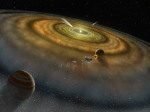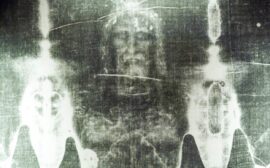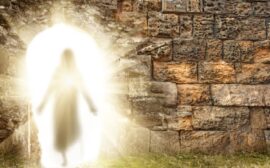To hear the broadcast of the show related to this topic. Click here.
Necessity of One God, Not Many
Pastor Brian Chilton
Many worldviews hold to polytheism. Polytheism is the belief in multiple gods or goddesses. Hindus are polytheistic as are Mormons. Hindus believe that God takes multiple manifestations in a variety of avatars. Whereas, Mormons believe that a Mormon couple can become their own gods and populate their own particular planet. LDS theology also ascribes to the belief that we exist from a union of a Father God and a Mother Goddess. However, when we understand what I call the necessity of existence, the reader will find that multiple gods and goddesses are not necessary.
Necessity of Existence
Necessity of existence means that a person, being, or force necessarily exists due to the nature of a certain effect. In other words, a creation demands a creator. Understanding the biology of life, it is understood that my existence demands the existence of parents. Due to biology and life, my existence came from a mother and a father. Does this show the LDS theology as true? Not really. Hold on and I will show you why. A mother and father are demanded because I exist regardless of whether you know my mother and father or not. The child necessitates two parents. This is not the only illustration we could use.
Think of the portrait Mona Lisa. Leonardo da Vinci painted the portrait in the 1500s. But even if we did not know Leonardo da Vinci, the philosopher could logically deduce that Leonardo da Vinci existed, even if Leonardo’s name was unknown, by the fact that the portrait exists. The creation necessitates a creator.
Recently, this writer purchased a Toyota car. Even though the names of the designer and creators of the car are unknown, the existence of a Toyota car in my parking lot necessitates the existence of a group of people creating the car. The creation demands designers. Some may read this and say, “Well, couldn’t it be argued that a group of gods and/or goddesses created the universe and everything in it?” Some could argue this, but when the necessity of the universal creator is known, multiple gods/goddesses are not necessary.
The Necessary Essentials of a Creator
Understanding the logic from before, it can be deduced that a creator is necessary for the universe. In recent years, it has been accepted by nearly everyone that the universe had a beginning. This is a fact established long ago in Scripture. “In the beginning God created the heavens and the earth” (Genesis 1:1, NASB). The writer of Hebrews states, “By faith we understand that the worlds were prepared by the word of God, so that what is seen was not made of the things which are visible” (Hebrews 11:3, NASB). From these verses, it can be established even scripturally that the universe had a beginning and is even expanding. Isaiah writes, “It is He who sits above the circle of the earth, and its inhabitants are like grasshoppers, who stretches out the heavens like a curtain and spreads them out like a tent to dwell in” (Isaiah 40:22, NASB).[1] Some attributes of the Creator can be seen from the creation.
First, the existence of God is necessitated. For anything to exist, a Creator must exist. Earlier, the illustration of da Vinci was used. In like manner, one could postulate that the masterpiece of creation painted on the canvass known as the universe demands, or necessitates, the existence of the Grand Artist: God. God’s existence is necessitated. Many atheists will seek to bend the laws of logic to make God unnecessary, but such philosophies are found to be in want. The only logically sound explanation is the necessity of God’s existence.
Second, the Creator must exceed the power found in the universe. The sum of the power of the universe must be able to be manipulated by the One who brought forth the universe. Therefore, this Creator must be All-Powerful…or Omnipotent.
Third, the universe was brought into existence at a certain point in time. From that point onward, time as we know it began to exist. Therefore, the Creator must be beyond the scope of time. Hence, the Creator must be beyond time…or eternal.
Fourth, the universe’s laws began to exist at the point in time of it’s’ creation. This means that all the formulations of the universe, the laws of physics, and the laws of nature began to exist at this point. Therefore, the Creator must hold wisdom beyond that which is found in the universe. Hence, the Creator must be super intelligent…or omniscient.
Fifth, the universe holds within it a moral code. Love must first be understood before hate can be known. A standard of perfection must exist before it can be known what is less than perfect. Therefore, the Creator must be holy and loving…or omnibenevolent.
Do these characteristics ring a bell? These characteristics should sound familiar to the theologian and the philosopher because they are terms that are used to describe the God of the Bible. Now, could more than one God exist?
It is possible that a plethora of gods exist, but it really is not necessary. For eventually, one primary God is necessitated. A God that is eternal, all-powerful, all-knowing, ever-present, and all-loving holds no equal. Anselm of Canterbury in the Proslogion stated that God was “that than which nothing greater can be conceived” (Anselm of Canterbury, Proslogion). A single God is necessitated by this characteristic. This is not to say that God could not have created lower gods and goddesses. But those created gods and goddesses would not be worthy of worship…only the Prime God would be worthy of such worship. The Bible tells us of heavenly beings that God created known as angels, but makes sure to show that angels are not to be worshipped. John the Revelator discovered this as he documented in Revelation, “I, John, am the one who heard and saw these things. And when I heard and saw, I fell down to worship at the feet of the angel who showed me these things. But he said to me, “Do not do that. I am a fellow servant of yours and of your brethren the prophets and of those who heed the words of this book. Worship God” (Revelation 22:6-9, NASB). With this in mind, some accuse Christians of holding to a “tri-theism” or a belief in th
ree gods. Is this true?
Is Christianity Guilty of “Tri-Theism”?
Although a proper exposition of the Trinity needs to be conducted to understand the issue completely (perhaps the topic for another article), here it is only necessary to address the issue of the Christian belief in the Trinity. For Christians, the Trinity is the belief in One God in three persons. The Father, Son, and the Holy Spirit’s divine persona are seen in the baptism of Jesus. Matthew records,
Then Jesus arrived from Galilee at the Jordan coming to John, to be baptized by him. But John tried to prevent Him, saying, “I have need to be baptized by You, and do You come to me?” But Jesus answering said to him, “Permit it at this time; for in this way it is fitting for us to fulfill all righteousness.” Then he permitted Him. After being baptized, Jesus came up immediately from the water; and behold, the heavens were opened, and he saw the Spirit of God descending as a dove and lighting on Him, and behold, a voice out of the heavens said, “This is My beloved Son, in whom I am well-pleased” (Matthew 3:13-17, NASB).
The Father is seen speaking from heaven. The Son is seen being baptized in the water. The Holy Spirit is seen descending like a dove. All three are described by divine characteristics. In the end, the Christian believes that there exists only One God: but that the One God has three personas in the Father, Son, and Holy Spirit.
The best way to illustrate the previous statement is to think about oneself. This writer is a father to his son, a husband to his wife, and a son to his parents; yet one person. This is about the best way to illustrate the Trinity: One God in three persons.
Conclusion:
Many would like to think that God is not necessary. My son likes for me to think according to this logic. Just now as I type this article, I heard a crash in the living room. I asked my son, “Honey, what did you do?” He said, “I didn’t do anything. My toys fell down and made a mess.” Everyone knows that it was my son who pulled the toys down and made the mess. The toys crashing to the floor were in direct response to my son’s tugging on them. Likewise, our existence and the existence of all of creation necessitate the existence of a powerful, knowledgeable, eternal, ever-present, all loving Creator. If one being meets these characteristics, no other is needed.
Would you like to personally know this God? You can. Simply invite Him into your life by using a sample prayer like that below.
“Lord Jesus, I know that I am a sinner and I do not deserve eternal life. But, I believe You died and rose from the grave to make me a new creation and to prepare me to dwell in your presence forever. Jesus, come into my life, take control of my life, forgive my sins and save me. I am now placing my trust in You alone for my salvation and I accept your free gift of eternal life.”
[1] From this verse, two profound truths are brought forth. One, Isaiah shows that the earth is not flat, but round. Two, Isaiah shows that God expanded the universe. Not only did Isaiah get the earth’s shape correct, Isaiah also was correct in describing the beginning and expansion of the universe.










